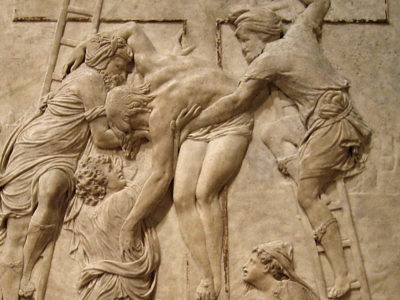IT’S A FAIR QUESTION that gets asked a lot.
Last month, another reader wanted an answer to a scholarly twist he put on that same question. You can read my answer here: Why did Jesus die?
But I just got the question again from a reader who seems more genuinely puzzled than theologically curious.
Here’s the question from Donna Lindsay, who wins a free book for asking.
Why did Jesus have to die for our sins? What sins did he die for? The ones committed up to his death? Or all, including mine? If so, does it mean we are all automatically saved, no matter what sin we commit? That just sounds silly! So back to my original question….what did Jesus die for and why? Was it just to show us that there is life after death?
First off, no, most scholars say the Bible doesn’t teach that we can sin all we want because the blood of Jesus has got us covered from now till kingdom come.
One anonymous Bible writer said that sternly enough: “If we deliberately continue sinning after we have received knowledge of the truth, there is no longer any sacrifice that will cover these sins” (Hebrews 10:26).
It seems that if we live a perpetually sinning life, we’ll set off a smoke alarm at the Pearly Gates.
As for the answer to the rest of Donna’s question, let me point to something I wrote in The Complete Guide to the Bible, page 333 in my edition.
Why did Jesus have to die?
You’d think the almighty God could have figured out a better plan of salvation.
Something less bloody.
Something that didn’t involve his son on a slab.
To be quite frank, God isn’t famous for explaining himself. Suffering Job would testify to that. God essentially told Job there are some things that physics-bound humans can’t understand about the spiritual dimension. In those cases, God expects people to trust him.
Perhaps that’s the case with Jesus’ death. Yet the Bible does offer a few clues about possible reasons.
Sin is a capital offense.
It has been from the beginning. God told Adam that if he broke the one and only law—eating forbidden fruit—“you are sure to die” (Genesis 2:17). Apostle Paul added, “The wages of sin is death” (Romans 6:23).
It’s as though God can’t tolerate sin any more than matter can tolerate anti-matter. We’re not going to find them in the same vicinity.
Life is in the blood.
God said as much when he set up the system of animal sacrifices. “The life of the body is in its blood. I have given you the blood on the altar to purify you, making you right with the LORD. It is the blood, given in exchange for a life, that makes purification possible” (Leviticus 17:11).
Jesus’ death fulfilled the death penalty requirement for everyone.
“Our High Priest offered himself to God as a single sacrifice for sins, good for all time. . . . When sins have been forgiven, there is no need to offer any more sacrifices” (Hebrews 10:12, 18).
Jesus’ death set the stage for the Resurrection.
It was the Resurrection that finally convinced Jesus’ disciples that he was God’s Son. They were convinced enough that most of them died as martyrs. After seeing Jesus risen from the dead, and hearing him promise the same future for them, they died expecting that “everyone who believes in him will not perish but have eternal life” (John 3:16).
Random book winner this week
Sandra Doane. I give away one free book a week to a randomly selected subscriber to my free blog and quarterly newsletter. Sandra is random this week.


It has been my experience that it is very hard to explain even the simplest things to some people. That does not mean they are stupid, or that I am not a very good communicator. It means that we all have different thought processes and different levels of understanding. How, then, could God explain, once and for all, the relationship He wished to establish with His people, to all people, in all times and places? He accepted responsibility for creating an imperfect humanity, and proved it in such a harsh way as to make a distinct impression. Is it the way I would have done it? Probably not, but I am not God and do not see clearly as He does.
Thanks Tom.